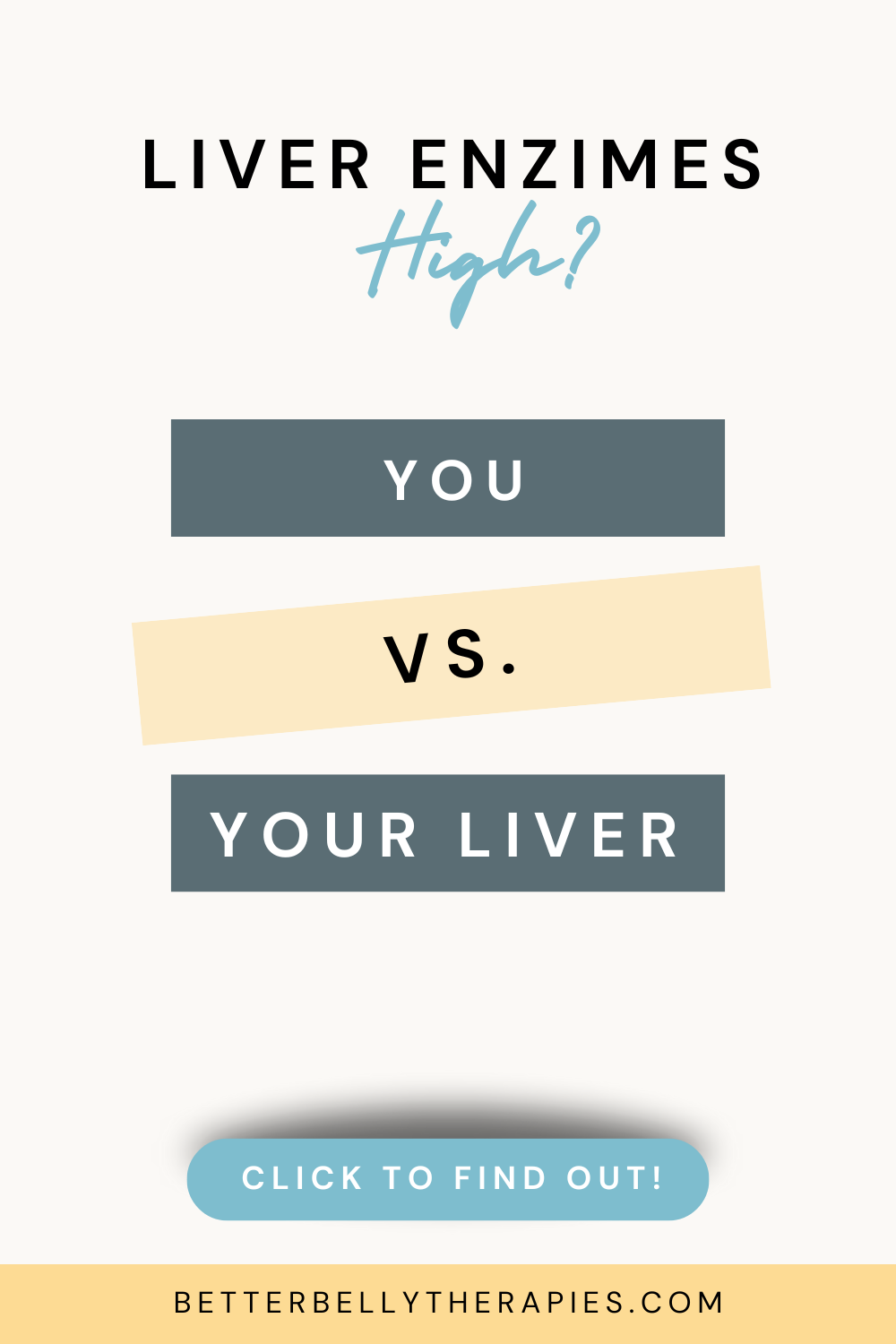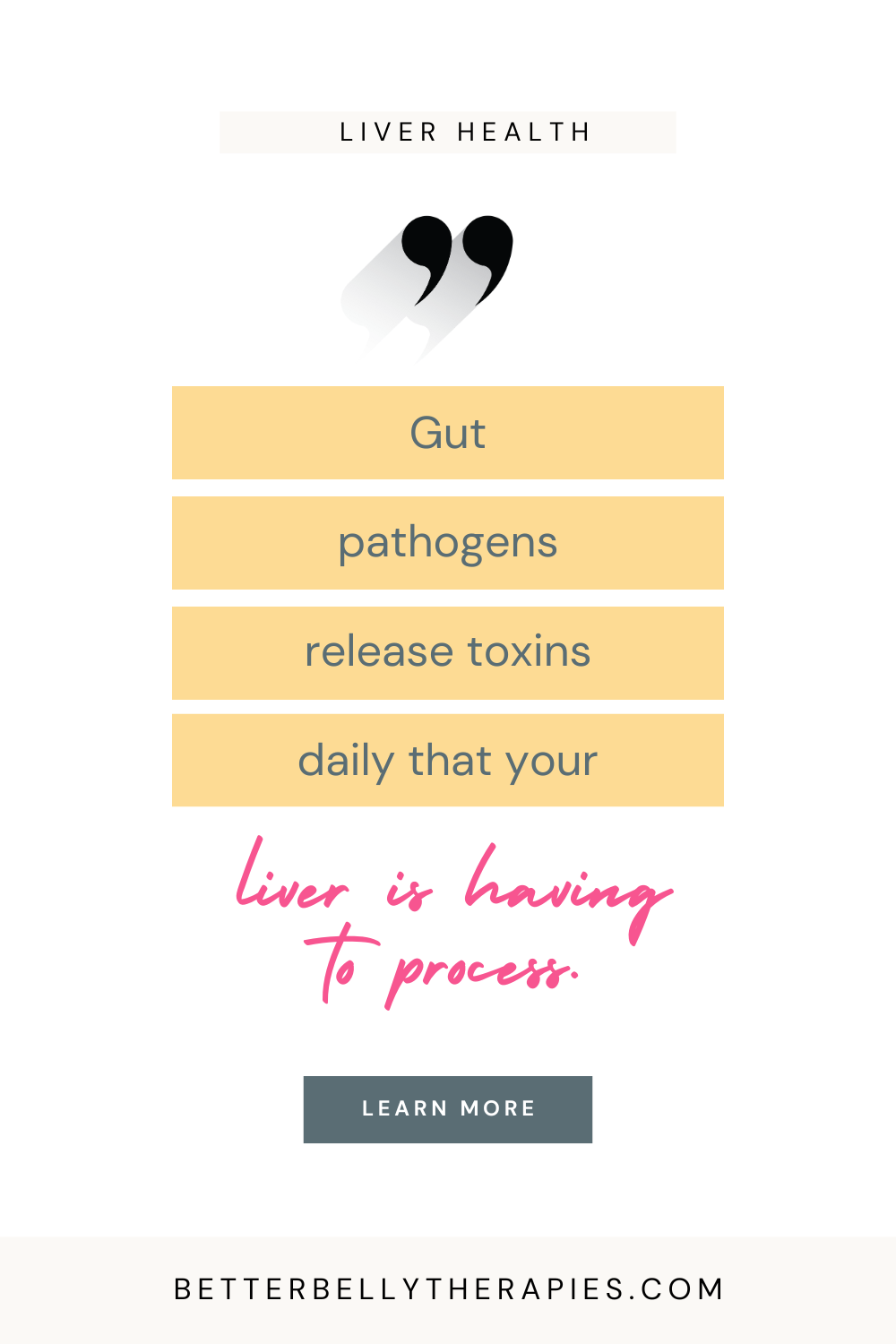Liver Enzymes High? Causes, Symptoms, and What to Do Next
Let’s get real. If you’ve ever had a doctor tell you your liver enzymes are too high and then said, “Just stop drinking alcohol,” and sent you home—then you’re not alone.
I see it all the time in my practice at Better Belly Therapies. Clients who look healthy on the outside. Labs that seem “fine.” Yet the AST and ALT poking up like flashing warning lights. And the doctor? Shrugs and says, “Keep an eye on it.”
Seemingly no answers. No next steps. Just WAIT.
This is BS.
Because what elevated liver enzymes actually signal is this: your liver is over‑loaded. It’s not a diagnosis by itself. It’s a red flag. And you deserve better than “we don’t know what that means for YOU.”
So buckle up. We’re diving into the real causes. The signs your liver is crying out for help (even if you don’t feel jaundiced). And how to support that liver so those enzyme numbers drop…and you finally feel better.
What Elevated Liver Enzymes Actually Mean: The Hidden Message From Your Body
When your doctor tells you your liver enzymes are high, what they’re really saying is: “Your liver is under stress.”
That’s it. Plain and simple.
Your liver is processing more than it can handle. Toxins. Hormones. Pathogens. Inflammation.
And here’s the kicker: If you don’t have obvious issues (fatty liver, viral hepatitis, massive drinking history), conventional medicine may just wave you off.
Because they’re trained to hunt full‑blown disease. But functional medicine? We use liver enzyme elevations as a clue—a signal that something needs shifting.
So yes: If you were told “stop alcohol and go home,” know this: your liver is still sending SOS signals. Let’s decode them.
Root Causes of Elevated Liver Enzymes Beyond Alcohol: Gut Pathogens, Leaky Gut & Hormone Overload
It’s easy to blame alcohol. And yes—if you’re drinking heavily, that absolutely can be the issue.
But if you don’t drink or you only drink minimally and your liver enzymes are still high—then we need to dig deeper.
Here are the real culprits I find in practice:
-
Gut pathogens & bacterial overgrowth. Think: mold, Candida, Small Intestinal Bacterial Overgrowth (SIBO), Helicobacter pylori, Clostridioides difficile (C. diff). These bad actors release toxins every single day—and your liver is on the cleanup crew.
-
Leaky gut & food sensitivities. When your gut lining is damaged, it lets things in that don’t belong there. Toxins, undigested bits of food, microbial fragments. Boom—liver stress. And yes, you might not have GI symptoms…food sensitivities often hide behind skin issues, brain fog, PMS and fatigue.
-
Toxin overload (environmental + internal). Even if you eat clean and use “natural” products, your liver may still carry a load. Mold exposure. Herbicides. Beauty‑product chemicals. Add that to food‑sensitivity inflammation above and you’ve got a toxic combo.
-
Mineral deficiencies. The liver’s detox enzymes require nutrients like zinc, selenium, magnesium and molybdenum. If you’re low? The liver struggles.
-
Medications or even “healthy” supplements. Yup. Some protocols or high‑dose supplements can temporarilyelevate liver enzymes—because you’re triggering detox. But if you’re not monitoring, that elevation could be confused with a “problem.”
-
Hormone / bile flow issues. When your liver can’t clear excess estrogen (thanks to poor bile flow, xenoestrogens, birth‑control implants or copper IUDs), then hormone‑load hits it hard. PMS, heavy periods, mood swings—all signals here.
-
Systemic infections, chronic inflammation, mold illness. These aren’t always screened in conventional medicine—but your liver may be filtering the fallout anyway.
So, when you’ve got unexplained elevated AST/ALT and you don’t drink heavily—this is where you look.

Symptoms That Hint Your Liver May Be In Trouble: Gut Symptoms, PMS & Fatigue Explained
Okay. So you’ve got elevated liver enzymes. But you might not feel “sick.” Yet.
That’s important. Your liver doesn’t always scream, “HELP!” loud enough to annoy you.
Sometimes it whispers.
Here are the whisper signs I see:
-
Bloating, constipation or diarrhea. When bile is thick or mis‑flowing, your small intestine isn’t breaking down food properly. Gut bacteria feast on that food and gas + motility issues follow.
-
PMS / heavy periods / breast tenderness / irritability. Excess estrogen = overloaded liver. When bile flow stutters, estrogen clearance goes off. Mood swings and cycle chaos? Check that liver.
-
Afternoon fatigue or waking up at 1‑3 AM sweating. That time window (1‑3 am) is prime liver‑repair hour. If you’re awake with your brain wired or sweating? Liver’s trying to catch up.
-
Brain fog, irritability, chemical sensitivity. When toxins sit inside your body, they hit your brain, your mood, your perceptions. Perfume gives you a headache. You feel “off” for no reason.
-
Yellowish eyes or skin, dark urine, nausea after fatty meals. These are more obvious. But don’t wait for jaundice‑level signs to take action.
Even if you don’t have all these symptoms—if you have elevated enzymes, and ANY of them ring true—you’re going to want to map what the liver is processing.
What to Test (Beyond Standard Liver Panels) to Pinpoint the Root Cause
Most doctors stop at AST, ALT, maybe GGT. But to truly find why your liver is stressed, we go much deeper.
Here’s what I recommend:
-
Advanced gut‑pathogen+overgrowth testing (for SIBO, H. pylori, C. diff, Candida, mold‑related microbes).
-
Leaky‑gut / intestinal‑permeability panels.
-
Food‑sensitivity testing (IgG or IgA). For example, I prefer the Vibrant Wellness Zoomer panel over typical MRT/Ome tests—more sensitive.
-
Mineral‐status labs (zinc, selenium, magnesium, molybdenum).
-
Hormone panels + bile‑flow/estrogen‑clearance markers.
-
Environmental‑toxins/mold panels if suspected.
-
Conventional liver imaging and viral/hepatic‑panels (to rule out “big disease” first).
The trick? We don’t wait for disease. We investigate the stress that’s happening now. And we apply targeted, root‐cause protocols.
How to Support Your Liver & Lower Elevated Enzymes (Real Steps You Can Take)
Here’s where we put it into motion—no fluff. If your liver enzymes are high and your doctor hasn’t given you a plan, here’s your game‑plan:
-
Stop PANICKING. Elevated enzymes = feedback, not your sentence.
-
Work with a functional practitioner (or DIY smartly) to interpret labs and protocols. This is not just “eat better” (though that helps!). It’s precision.
-
Remove the load. That means:
-
Clean up your diet: reduce processed foods, sugar, poor oils.
-
Address gut pathogens/leaky gut. Kill what’s inflaming; heal the lining.
-
Support bile flow: bitter foods, magnesium, hydration, gentle movement.
-
Detox support (non‑extreme): optimize minerals (zinc, selenium, molybdenum); reduce chemical exposures; manage mold.
-
Balance hormones: ensure estrogen clearance, support liver‐friendly hormone protocols if needed.
-
Monitor and adjust supplementation: If a protocol elevates your enzymes, track it and allow time for “detox spike” that returns to baseline.
-
-
Retest after ~3‑6 months. Your goal: enzymes trending down, symptoms improving.
-
Use a structured system. For example, in the Better Belly Blueprint I walk clients through:
-
Step‑by‑step lab ordering.
-
Protocol templates based on results.
-
Education so YOU become your own practitioner (so you pay less, gain knowledge, and resolve this quicker).
-
This isn’t about random pills. It’s about targeted healing from the inside out.

Real Talk: Why Conventional Doctors Often Miss the Forest for the Trees
Here’s a little insider story: One of my clients had normal labs across the board—except elevated ALT/AST. Her doctors said: “You’re fine—just stay off alcohol.” She left feeling scared, confused, and alone. Then she joined the Blueprint. We found gut pathogens. We healed leaky gut. We optimized minerals. Her enzymes dropped and her mood, cycle and gut shifted.
Why do doctors often just shrug? Because they’re trained to spot full‑blown disease (like cirrhosis, hepatitis, fatty‑liver disease). If your labs don’t scream “disease,” they assume “nothing.” They don’t always see the stress phase. That’s where YOU can step in and take control.
Final Call: Don’t Wait Years for Answers—Take Action Now
If you’ve been waiting months or years hearing: “Keep an eye on it,” or “Just avoid alcohol,” and you still feel not‑okay—this is your wake‑up call. Elevated liver enzymes don’t have to mean “bad news.” They can mean “ah‑ha moment.”
You deserve: clarity. Real testing. Actionable protocols. Relief. The energy and hormone and gut health you’ve been waiting for.
So…what’s your next move?
-
Head over to betterbellytherapies.com/blueprint → Join the Blueprint and get the testing kit, protocols, and support.
-
Already working with someone? Make sure they’re doing the advanced labs listed above.
-
Start tracking symptoms (bloating, period pain, 1‑3am wake‑ups). Use them as your signal lights.
You’re not stuck. You’re not “just lucky” if your labs are okay. This IS fixable. And you’re ready.
Quick Recap
-
Elevated liver enzymes = liver under stress—not always alcohol alone.
-
Root causes: gut pathogens, leaky gut, food sensitivities, toxins, hormone overload.
-
Key symptoms: bloating/constipation, PMS/irritability, fatigue/1‑3 am wake‑ups, brain fog.
-
Testing beyond basics: gut pathogen panels, food‑sensitivity, mineral labs, hormone/bile flow markers.
-
Protocol: remove load → support liver (minerals, bile flow) → retest → refine.
-
Don’t wait. You have real tools. Real results await. 🔥
FAQ
Q: Can “normal” liver enzyme numbers still mean trouble?
Yes. Even borderline elevation or a trend upward matters. Your liver doesn’t leave giant red flags until later. Functional work catches the stress early.
Q: If I don’t drink alcohol, how could my liver enzymes be high?
Lots of ways: gut pathogens releasing toxins, leaky gut, food sensitivities, estrogen overload, environmental toxins. Alcohol is one cause—but not the only one.
Q: How long does it take to lower elevated liver enzymes?
It depends on the root cause. With the right protocol—it could be 3‑6 months. Some clients see improvements earlier. Labs + symptom tracking tell the story.
Q: Are generic detox supplements enough to fix this?
Not usually. Without addressing why your liver is stressed you’ll repeat the cycle. Targeted testing + personalized protocol = far better outcome.
Q: What if my doctor refuses advanced testing?
You can work with a functional practitioner (online even) who can order the labs listed above—or you can use direct‑to‑consumer labs. You don’t have to wait for traditional medicine to “approve” your healing journey.
Author Bio:
Written by Allison Jordan, FDN‑P — gut and hormone health specialist and founder of Better Belly Therapies. With over 150 clients healed and 650+ program participants globally, Allison challenges conventional wisdom and delivers root‑cause solutions for gut, hormone, skin, sleep and brain issues.


RELATED EPISODES:
- 69// How to Naturally Lower Your Cholesterol – Without Having to Give Up Fat or Meat
- 118// LIVER: The #1 Thing You Can Do to Ease Bloating and PMS
- 233// H. Pylori: Symptoms of H. Pylori, How to Interpret H. Pylori Test Results, and Why H. Pylori Treatments Fail
- 267// The Best Food Sensitivity Test for You, with Vibrant Wellness
HEAL YOUR GUT TODAY!
-
- Want to learn how BBB works? Watch this FREE training walking you through how to heal, once and for all!
-
- Want to make sure that VIP is right for you? Book a FREE 20 Min Application Call!
RESOURCES:
- Subscribe to our Weekly Podcast Newsletter
- Download the entire Better Belly Podcast Vault!
- Grab my FREE 60+ Page Family Recipe Book (Gluten Free, Grain Free, and Dairy Free!)
- Download my Free Constipation Relief Guide
- Get Full Access to my Liver Detox Protocol for only $7!
- Get the Functional Blood Chemistry Analysis Spreadsheet
LINKS:
- JOIN → Join our FREE Facebook Group
- FOLLOW → @betterbellytherapies
- ASK → Ask a Question for the Podcast
- WORK WITH US → betterbellytherapies.com
SHOW US YOUR LOVE:
- If this podcast episode made positively impacted you, please leave a Rating and Review for the podcast. It'd mean so much! ❤️
+ view comments . . .